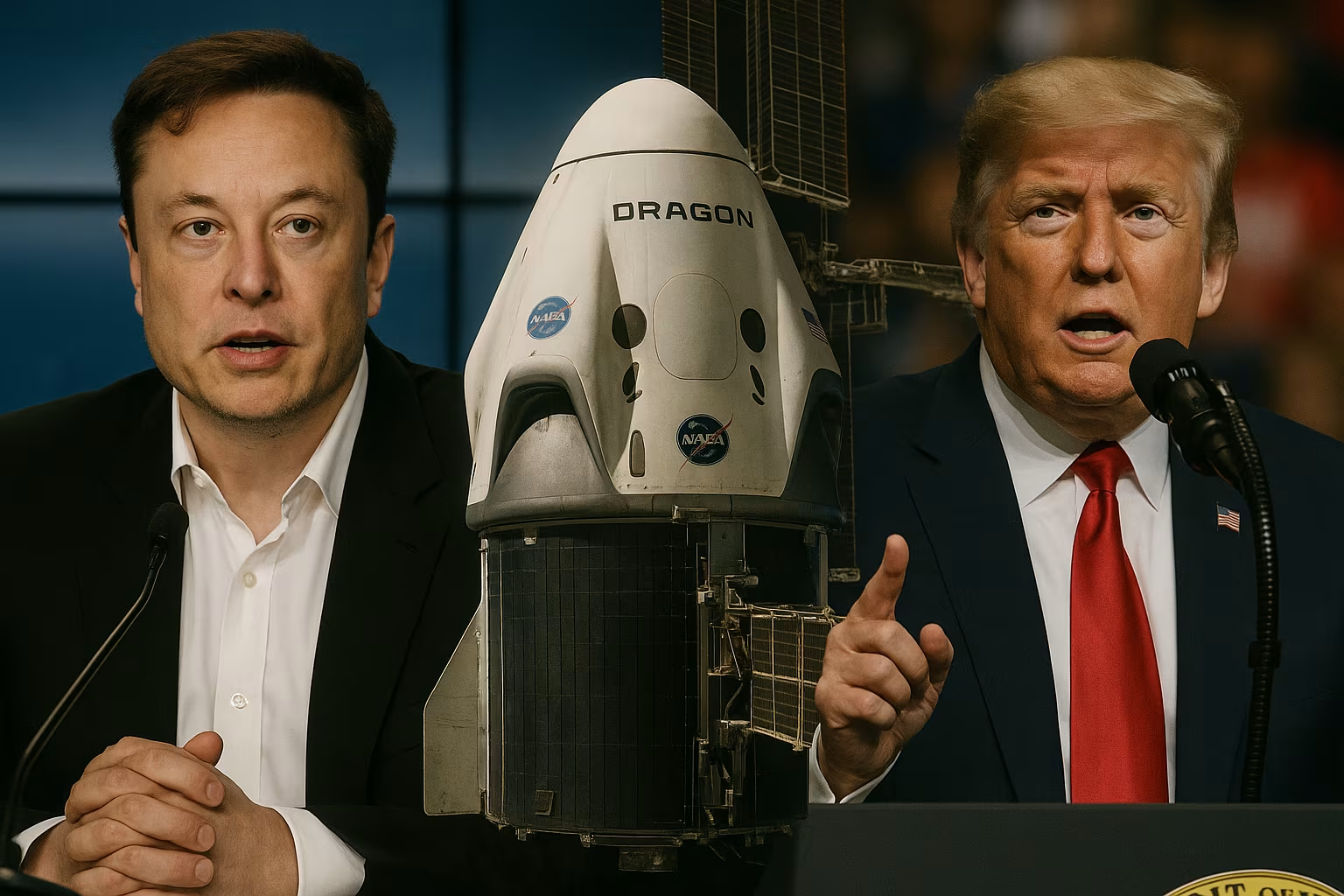Elon Musk is no stranger to making headlines with bold statements, but his latest clash with former President Donald Trump has drawn attention from both political and space industry circles. The controversy unfolded after Trump publicly criticized Musk’s companies, prompting the billionaire to suggest he might “decommission” SpaceX’s Dragon spacecraft — a critical vehicle for NASA missions.
Within hours, Musk softened his stance, walking back the threat and assuring partners that Dragon operations would continue. But the episode sparked questions about how personal disputes can ripple into industries as vital as space transportation.
The Spark: Trump’s Criticism of Musk’s Businesses
The tension began when Trump, speaking at a campaign rally, took aim at Musk’s business dealings and political influence. The former president questioned Musk’s commitment to the U.S., claiming some of his ventures relied too heavily on government contracts and subsidies.
Trump’s comments singled out both Tesla and SpaceX, suggesting that Musk’s influence over key sectors — renewable energy and aerospace — could be “dangerous” if not balanced by competition.
For Musk, who has often portrayed himself as a champion of free enterprise and innovation, the remarks struck a nerve.
Musk’s Threat to Decommission Dragon
Shortly after Trump’s comments circulated on social media, Musk took to X (formerly Twitter) to respond. In a post that quickly went viral, he wrote:
“If political games put the future of space exploration at risk, we might as well retire Dragon and let someone else handle it.”
The Dragon spacecraft, in both its Cargo Dragon and Crew Dragon variants, is a workhorse for NASA and international partners. It transports supplies, scientific experiments, and astronauts to the International Space Station (ISS) — a role SpaceX has held since the retirement of the Space Shuttle in 2011.
The mere suggestion of decommissioning Dragon sent shockwaves through the aerospace community. Analysts noted that such a move would leave NASA scrambling for alternatives, potentially disrupting scheduled ISS missions.
Industry Reaction: Concern and Skepticism
Industry leaders, space policy experts, and NASA officials responded with a mix of concern and skepticism. While some dismissed Musk’s comments as rhetorical posturing, others worried about the potential consequences of tying critical infrastructure decisions to political disputes.
A senior NASA official, speaking on background, said:
“Dragon is a key part of our operational capacity. We take any suggestion of decommissioning seriously, but we also know Mr. Musk often uses strong language to make a point.”
Competitors in the commercial spaceflight sector — such as Boeing with its Starliner capsule — could theoretically fill the gap, but delays and technical setbacks in recent years have made Dragon the more reliable option.
Musk Walks It Back
By the next day, Musk had revised his position. In a follow-up post, he clarified:
“To be clear, Dragon isn’t going anywhere. My comment was about the principle that space exploration should be free from political interference.”
He emphasized that SpaceX remains committed to fulfilling its contracts with NASA and maintaining the regular cadence of Dragon flights. Musk also noted that work on Starship, the company’s next-generation spacecraft, continues at full speed, but Dragon will remain operational until Starship is fully certified for crewed missions.
The Political Backdrop
This dust-up comes amid heightened political polarization in the U.S., where high-profile business leaders are increasingly drawn into public disputes. Musk’s influence spans multiple industries — space, automotive, energy, and social media — making him a frequent target for both praise and criticism.
The Trump-Musk exchange reflects a broader dynamic: as commercial space companies take on roles once reserved for government agencies, their leadership becomes more visible — and more politically exposed.
Space policy analyst Dr. Karen Whitfield notes:
“The space sector is no longer insulated from political rhetoric. Leaders like Musk, who have large public profiles, must navigate the intersection of business, politics, and national interests.”
Why Dragon Matters
The Crew Dragon capsule is currently the only American spacecraft certified to carry astronauts to the ISS. It has conducted multiple successful crewed missions under NASA’s Commercial Crew Program, reducing reliance on Russian Soyuz rockets.
Cargo Dragon flights keep the ISS stocked with supplies, spare parts, and research materials. Without these missions, the station’s operations would be severely disrupted.
Even if Musk’s comment was off-the-cuff, it underscored the vulnerability of relying heavily on one provider for such critical capabilities.
SpaceX’s Strategic Position
SpaceX is working toward transitioning from Dragon to its much larger Starship vehicle, which promises greater capacity and full reusability. However, Starship is still undergoing testing, and it may be several years before it can fully take over ISS crew and cargo missions.
Until then, Dragon remains indispensable — and any hint at retiring it prematurely raises legitimate operational concerns.
The PR Lesson for Space Industry Leaders
The incident highlights the communication challenges faced by CEOs of companies deeply integrated with national infrastructure. Off-the-cuff remarks, especially from high-profile figures like Musk, can trigger market speculation, disrupt partner relationships, and attract political scrutiny.
In this case, Musk’s quick walk-back prevented escalation, but it also served as a reminder that the aerospace sector depends on stability and trust as much as it does on engineering excellence.
Elon Musk’s brief threat to “decommission” SpaceX’s Dragon spacecraft may have been more rhetorical than real, but it was enough to set off alarms in the space community. The Dragon program is a backbone of NASA’s human spaceflight operations, and its removal would create a major gap in capability.
By walking back the statement, Musk reassured partners and preserved SpaceX’s role as a reliable launch provider. Still, the episode underscores the delicate balance between private innovation and public responsibility — especially when the stakes are as high as human access to space.





